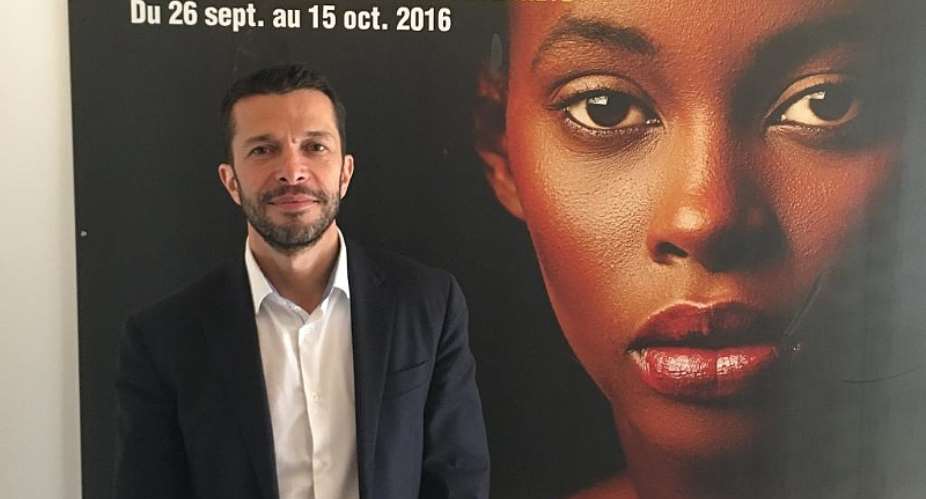Bordeaux deputy mayor in charge of diversity, Marik Fetouh, says he will continue efforts to spread awareness about the horrors of slavery and the city's role in it, after the departure of longtime mayor Alain Juppé, as the city revisits the issue of slavery on the occasion of Black History Month.
Fetouh arrives at Bordeaux city hall, a stunning 18th-century palace, in haste.
The deputy mayor in charge of diversity has been meeting with Alain Juppé's potential successor, Nicolas Florian all morning, and is nearly an hour late.
"This has never happened before," he apologises profusely.
The southwestern city he's run since 2014 is still reeling from the shock departure of Juppé, a former centre-right prime minister, which has all of a sudden accelerated Fetouh's schedule.
The departure of Juppé, who is credited with bringing Bordeaux's role in the slave trade to the forefront after years of neglect, has also created uncertainty about the city's efforts to commemorate slavery.
"With the new mayor, we discussed a precise plan of action for slavery remembrance. He told me that not only will Bordeaux pursue its current efforts, but it will go even further.
"There is nothing to worry about," he insists.
Not everyone is so sure. For years, local groups like Mémoires et Partages have criticised the French port city for failing to acknowledge its slavery past.
Painful remembrance
Between the 17th and 19th centuries, ship-owners deported some 150,000 Africans to plantations across the Atlantic and traded them for sugar and tobacco, which they then brought back to Bordeaux.
"Remembering slavery is difficult," admits the 42-year-old, born of an Algerian father and a Bordelaise mother.
"There is always an element of guilt. Our meetings with rights groups can very often end in a clash," he explains.
Contentious issues include reparations. "Too complicated," says Fetouh. "How do you identify the beneficiaries of a crime dating back to the 18th century?
"If there are to be reparations, it would be in the form of development and partnership with Haiti," formerly Saint-Domingue, a French colony dominated by Bordelais slave owners.
Moreover, "Bordeaux is not the only city in France concerned by slavery or the slave trade," argues the deputy mayor of diversity, insisting reparations are "a matter of national conscience."
Indeed, Nantes was by far the largest port of the Atlantic trade, organising over 1,700 slave trade expeditions across the Atlantic compared to Bordeaux's 400.
Fuelling slavery
Yet Bordeaux, through its direct trade of goods with the colonies indirectly fuelled the slave trade. Slaves were the ones who produced the goods brought back to the port town.
"Identifying who's to blame is difficult," continues Fetouh. "When we discuss the slave trade it is easy to find the culprit. You only have to look at the ships that were involved to find out. But in Bordeaux, all the archives were burnt."
That is not the only difficulty. The opacity of Bordeaux's trade with the colonies, known in French as commerce en droiture, made it less apparent to pinpoint the links to slavery.
"The entire port and industry lived off this form of trade. The practice was widespread. That is why remembering slavery in Bordeaux has been so difficult, because we couldn't see the links to it," he argues.
Visibility, or lack of, has long been an argument used against Bordeaux by campaign groups. There is no visible memorial as in Nantes for instance, recognising and acknowledging the people Bordeaux enslaved.
Quest for atonement
Fetouh admits that the city "has been slow" to come to terms with its past, under pressure from lobby groups not to tarnish the town's image as one of Europe's top wine regions.
Today, mentalities are starting to change.
"We have made significant strides in recent years to improve awareness about slavery," explains Fetouh, referring to the permanent collection at the Aquitaine museum established in 2009, retracing Bordeaux's dark past.
The drive to improve awareness about slavery also received new momentum in 2015 with the creation of a special commission that Fetouh launched.
The commission came up with ten proposals based on findings from an online survey that include a statue to honour Modeste Testas , a former slave bought by a rich Bordelais family in the colonies, who has come to symbolise the face of the city's human trafficking.
"It will allow us to make our work on slavery remembrance visible," states Fetouh, adding that an annual budget of 150,000 euros has been set aside for the cause.
The statue of Modeste Testas, set to be unveiled on 10 May on national slavery and abolition day, "will allow us to honour all the victims of this crime against humanity." And prove that Bordeaux has accepted its past.





 We’ll no longer tolerate your empty, unwarranted attacks – TUC blasts Prof Adei
We’ll no longer tolerate your empty, unwarranted attacks – TUC blasts Prof Adei
 Bawumia donates GHc200,000 to support Madina fire victims
Bawumia donates GHc200,000 to support Madina fire victims
 IMF to disburse US$360million third tranche to Ghana without creditors MoU
IMF to disburse US$360million third tranche to Ghana without creditors MoU
 Truck owner share insights into train collision incident
Truck owner share insights into train collision incident
 Paramount chief of Bassare Traditional Area passes on
Paramount chief of Bassare Traditional Area passes on
 Two teachers in court over alleged illegal possession of BECE papers
Two teachers in court over alleged illegal possession of BECE papers
 Sunyani: Victim allegedly shot by traditional warriors appeals for justice
Sunyani: Victim allegedly shot by traditional warriors appeals for justice
 Mahama vows to scrap teacher licensure exams, review Free SHS policy
Mahama vows to scrap teacher licensure exams, review Free SHS policy
 Government will replace burnt Madina shops with a new three-story, 120-store fac...
Government will replace burnt Madina shops with a new three-story, 120-store fac...
